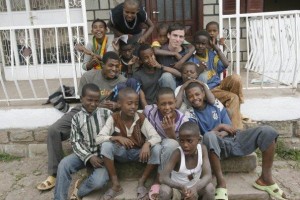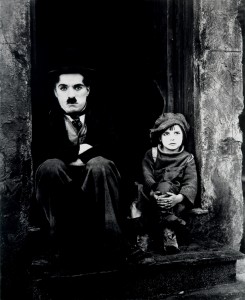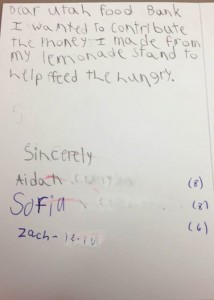(This piece is cross-posted at No Poor Among Them).
Several months ago, our family had a movie night. The film was Charlie Chaplin’s The Kid, a 1921 silent film where Chaplin plays–what else–a tramp who has fallen on hard times. To make matters more difficult for the tramp, a woman abandons her child and somehow, Chaplin’s character ends up with him. As the film goes on, the tramp and the child grow in affection for one another, and make a living by duping people through various schemes. After some time, it is discovered that the tramp is not the boy’s father, and two men from an orphanage come to take the boy away. Of course, at this point, the tramp and the boy were as good as father and son. Now, I won’t spoil the entire plot, after all the film has only been out ninety-two years. But as my three year old son and I watched the film, I tried to explain the plot to him. The men from the orphanage took the child from his father figure, I asked my boy if he would be sad if he were taken from us (because I am a terrible parent, obviously). My son started to sob. I immediately hugged him and reassured him that his mom and I would never let him go and that we would always be there for him. It was a touching moment for me, and I hope for him in a positive sense as well.
I have thought about that experience a lot over the months that it happened. As I have become more sensitive and aware of human suffering in the world, I am trying to do more to assist people in need and organizations which support those in need. As I do so, I desperately want to include my two boys (now four and twenty months). Granted, I don’t expect them to entirely understand what is happening when we donate to an organization online, but somehow, in some way, I want my children to have empathy for those who suffer in the world as they live in relative comfort.
My interest to teach my children empathy grew after reading a powerful article about the lives of street children by author Ben Faccini, who recently co-authored a book containing the stories of street children from around the world. In it, he wrestles with his desire to keep his children safe, comfortable, and away from terrible situations, while teaching them just what these street children go through on a daily basis. He wants them to learn empathy without breaking their innocence. After returning from a trip to Mongolia he recalls:
I remember repeatedly feeling bewildered by my own young children. As I got them ready for bed, I found myself struggling to chase away insistent images of the Mongolian children in the heating vents [many of these children lived beneath manhole covers where they were warmed by pipes carrying scalding water]. Yet I had to banish those very fresh memories in order just to be with my children. I became quickly frustrated by their complaints about life: ‘I don’t like my peas and mash touching’; ‘I’m not watching Robin Hood again’. These were the capricious banalities of children used to comfort, and I wanted to yell at them that they didn’t realize how lucky they were.
However, my frustration hid many layers of unresolved emotion. I had hoped that my recent experiences would anaesthetise me to the pettiness of family life. Instead, I felt a real bleakness, and its slow bitterness released itself into my parenting. Mongolia had made me doubly aware how precious childhood was but, equally, I was repulsed by my own children’s innocence. Their cleanliness, abundant food and clothing felt like an obscenity. On more than one occasion, I had to pull the car over, the engine running, and stare into space for a few seconds while the children bickered behind about their car seats touching each other, their feet kicking me in the back. A silent rage had overcome me and I didn’t know how to deal with it.
Reading about the difficulty he had in determining how to approach the subject with his children, notwithstanding being around these street kids as a profession, really made me think about how I should approach these things with my kids.

A group of former street kids from Addis Ababa, Ethiopia live in a home with Jason Burton (right of center). The organization which Jason founded is Yehiwot Reay, or “Vision of Life.”
Once a month, I take a budgeted amount of money and donate to various organizations which help the poor and the needy locally and throughout the world. It is a small gesture, but I hope it makes a difference. As I donate to these organizations, Jana encourages me to include the kids in the process. Though I am pretty certain my 20 month old and four year old sons won’t quite understand what’s going on, I have high hopes for them that they will develop greater empathy for those in need much sooner than I did. But so far, I am either met with one covering his ears as I explain where the money is going (the four year old), or with a consuming desire to hit the keys on the keyboard (my 20 month old). I’m not certain, but I am pretty sure my son’s reaction is a result of poor parenting on my part. I, of course, understand that self-discovery would teach him empathy much better than I ever could, but what if that takes a while and opportunities for him to alleviate suffering are passed by? Is it moral of me to let life pass us by in our safe and prosperous community, while not even hinting at the pain and anguish that millions of children around his age go through every single day?
I was touched when I read recently that three kids from Sugar House, Utah sent the proceeds of their lemonade stand ($36.50) to the Utah Food Bank. Accompanying the small check was a note which read, “Dear Utah Food Bank, I wanted to contribute the money I made from my lemonade stand to help feed the hungry. Sincerely, Aidan, Sofia, and Zach.”
I have about five years to get my own kids up to speed with these kids. What are ways that you have found success for teaching your own kids or young people empathy?







The first link to the No Poor Among Them site is broken.
Fixed thanks Joseph!
David – this is so PERFECT. Thank you for all that you do!
With my 7 year old, we get on kiva.org micro lending site. I have him read the stories and tell me which projects we want to lend money to. He tells me their story of what those people need and then I let him decide where the money goes. The pictures and stories on kiva give a good picture of what is going on outside of our bubble.
Paul, I love it. Kiva is really great for that reason, among others. The friend I started No Poor Among Them with is actually a fellow for Kiva this summer. He will definitely be writing about his experience doing that.
I really love a lot of small organizations for that reason as well. They can often do a better job of facilitating real interactions with the people your donations help. My wife has been baking bread at a local farmers market with all the proceeds going toward sponsoring a street child in Ethiopia. We just started doing this, but can’t wait to have a pen pal relationship with the boy we are sponsoring.
David,
Thank you for this beautiful and carefully articulated article. I am struck by how often the question of “What should childhood be to create good people?” comes up in our house of 4 kids, ages 11 to 20. I think in America, it happens the some kids learn by being the kids who are excluded for personality or economic reasons. That’s the awful way to learn empathy (and worthlessness). Some kids develop it from reading stories about neglected kids and animals. The key in those kinds of observational learning is identification with the excluded.
In my family, we have a generation that came out of the depression era, when alcoholism and sexism were able to exert great injustices on the women and children of men who worked little and chose to drink the paycheck. The children of those homes, in hardship, did not learn empathy. The opposite: they have wild personality disorders such as Narcissistic Personality Disorder, primary trait of which is lack of appreciation or sometime even lack of comprehension of any other viewpoint than their own. These children *were* the victims and felt unsafe and unloved and so for whatever reason — and I think it was being exposed to existential fear, “Am I going to have food to eat? Am I going to be safe?” without safety.
From my viewpoint, it seems that the child that watches Charlie Chapman’s The Kid should do so in the company of a loving, reassuring parent or parent figure… just as you did. We have had many experiences with our youngest who is distressed by the pain of others and needs to be comforted (as if it were happening to him). A sweet story – when he watched Temple Grandin, the movie, he was so distraught over the near-continuous misunderstanding and failure to appreciate Temple because she was so different (autistic) that he wanted to look her up and call her at her (now) hugely successful current position at Colorado State University to comfort her. He continues to talk about marginalized people and how they need to know all the time that they are included.
Thanks so much for the anecdotes. That is a great story about Temple Grandin. I really think that art and media can be useful in teaching empathy when life otherwise seems so easy for us. And definitely, it’s important for a parent or loved one to be there with the kids to help them absorb/come to terms with the injustices that occur in the world.
The teaching can be difficult, even when the children are adults. Last Christmas I proposed to my adult children that we not exchange gifts to each other, but take the money we would have spent and donate it to local charities of our choice. I split it up between Road Home, the Women’s Recovery Center, and the Utah Food Bank.
I only got two responses from the four children, one affirming the request, the other angry because I was micromanaging how they expressed Christmas. Apparently a major fail on my part in teaching charity and caring.
It sounds like we both tend to be hard on ourselves. I don’t have any answers (which is why I had so many questions in the piece), but it sounds to me like you are giving it your best.
Dave you are a great Dad. You are doing good for others. As you continue to do so and include them they will catch on.
As I said to you one time before about bringing up social, political, as well as religious issues to discuss with your children at supper or other moments is giving them an awareness of the world around them outside their home.
Of course always showing unconditional love to your children is a good start.
Thanks for the article.
Thanks for the sound advice, Mom of 10. I’d say based on the outcomes of your kids, and how many times you’ve been through it, you’re a pretty trustworthy source on the matter.
It is really quite simple. Children imitate what they see. If you show empathy toward others, they see it and they imitate it. When you give they are learning to give. Include them in the giving. They can donate old clothes, shoes, and pick out what toys they want to donate to those in need.
So you’re saying I have to show a good example? That sounds hard to me. 🙂